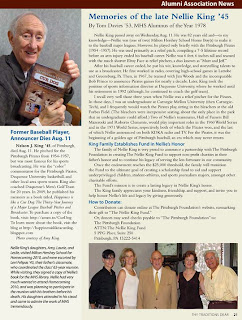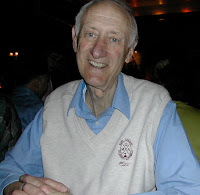The 1956 season was the most enjoyable season of my major league career. I was part of the Pirates’ team that moved into first place in the National League on June 12, 1956 after a game against the Reds that was particularly memorable for me. With the Pirates leading 4-3 in the bottom of the ninth inning with one out and runners at first and second, Bobby Bragan brought me in to relieve Elroy Face. The first batter I faced was Johnny Temple, a player I knew from Columbia, SC when I was pitching for the Charleston Rebels in 1950. I jammed Temple on the first pitch with a sinking fastball which he hit on a two-hopper to third base for what looked like a certain double play, but Bill Mazeroski was not yet on the Pirates’ roster and we failed to turn the game ending double play.
With two out and runners at first and third, I had to face Frank Robinson, who, in his rookie season, was quickly building credibility for a Hall of Fame career. Catcher Hank Foiles came out to the mound to discuss the situation, telling me confidently, “We’ll start him off low and away.” To which I replied, “Hell, Hank, if I could start everyone off low and away, I wouldn’t be coming in now, I’d be starting!” We both laughed and agreed I would try to get ahead using my best pitch, a sinker that he fouled off. The next pitch was a curve ball that Robinson swung on and missed.
Now out in front 0-2, Foiles wanted another curve ball, which I threw just off the outside corner for show and it was taken for a ball. Foiles signaled for another curve ball, which I shook off. During an eight year career in the minors I had mastered the art of deception Branch Rickey had said was so necessary for a pitcher’s success. I learned how to move the ball in and out on batters and wanted to throw a fastball on the outside corner. My reasoning was that Robinson had seen three pitches, a fastball inside and two curve balls away.
I wanted to throw a pitch on the outside corner with a fastball and have the pitch move back over the plate for a strike. I placed it as perfectly as I had ever done. I knew I had fooled Robinson, who was looking for another curve ball. Pitchers can see the look on the face of hitters when they are fooled; their eyes suddenly open wide and know they have to make a quick decision. That happened to Robinson, who swung late and struck-out.
I felt the pride and joy artists feel when they complete a painting as planned. To make it more rewarding, the Pirates moved into first place for the first time in many years. It was a new and exciting feeling for a group of young players. This was the beginning of the success the Pirates would feel in coming years, culminating in the 1960 World Series. Even though the 1956 success didn’t last through the second half of the season (we finished seventh), it was the first sign that our team could compete and win at this level of baseball. I was not a member of the Pirates’ team that won the 1960 World Series, but I shared the joy and satisfaction of that unforgettable season.....












